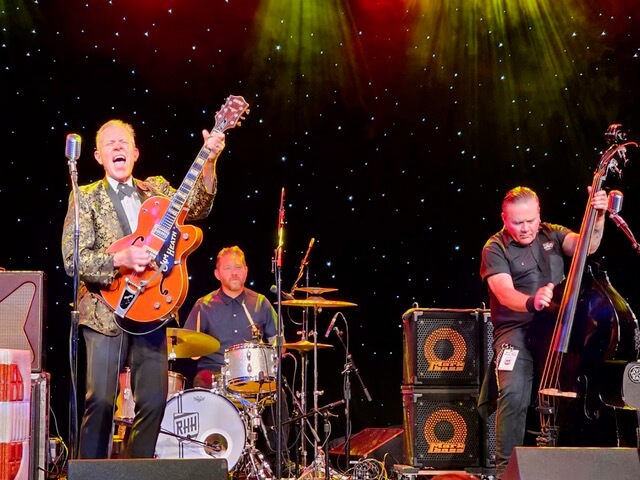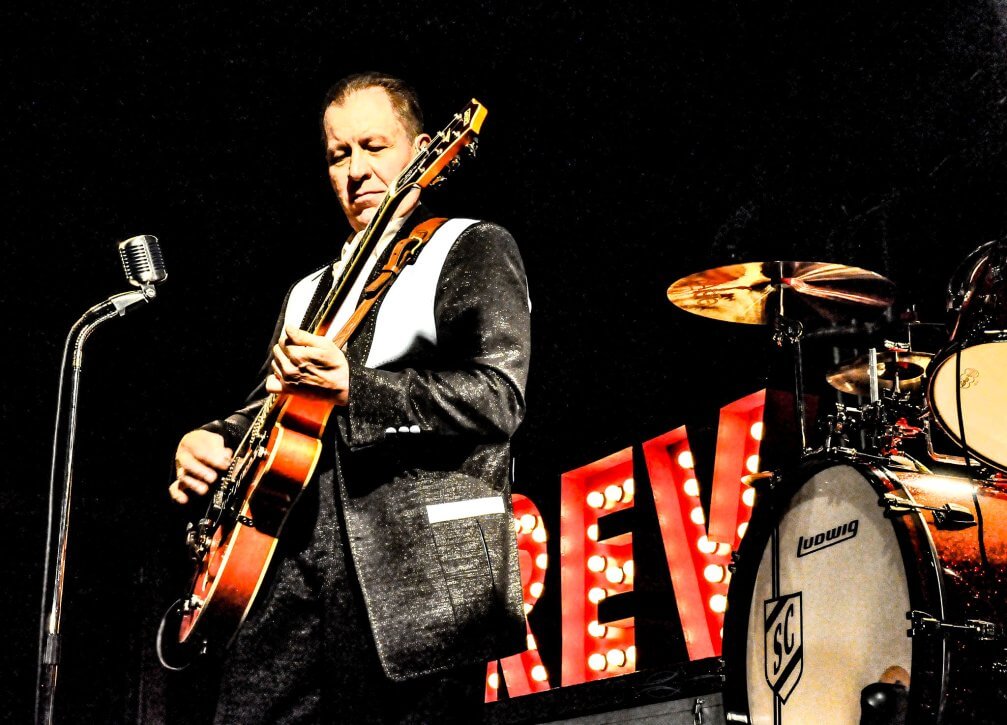

Reverend Horton Heat (RHH) is a Texas-born Rockabilly band fronted by singer, songwriter and guitarist, Jim Heath. Known for their high energy and unique genre-bending sound, RHH blends elements of country, surf and punk music. The trio grew popular throughout the 90s with notable songs like Psychobilly Freakout and Bales of Cocaine.
Today, the band continues to tour across the country and will be making a stop in Pensacola this month to perform at The Handlebar. We had a chance to sit down with Heath ahead of the band’s show to learn more about his childhood, music and career.
RHH will perform on May 15 at The Handlebar in downtown Pensacola. Tickets start at $20 and can be purchased online at thehandlebar850.com. To learn more about the band, follow @revhortonheatofficial on Instagram or @reverendhortonheat on Facebook.
DTC: Take me back to when you first got started. What was your introduction to music like?
JH: When I was a kid, my parents kind of played, but it was church for them and a little bit for me too. My mother could sing four-part harmonies when she was a little girl. But the funny thing about them is that they were not rock and rollers. They were older when they had me so they were big band people. I got exposed to a lot of stuff like that—big band, musicals and movie themes. They would buy the album from the movies like Pink Panther. I learned about rock and roll, rockabilly, Johnny Cash and all that stuff from my cousins and my extended family. The first song I tried to learn to play on guitar when I was about six or seven years old was Johnny Cash’s Folsom Prison Blues. From there, just like anybody else, I went through phases. There was a record store that I could ride my bike to when I was a 12 or 13 year-old kid interested in rock and roll. I was probably going to go buy a Black Sabbath or Alice Cooper album, but the guy at the record store had a big blues selection and he was always playing blues.
I heard Howlin’ Wolf and I was just like ‘that’s really cool music.’ And so I got into the blues and that led me to wanting to learn to play guitar. So I was a young blues bass guitar player. The next thing I know, my little garage band we had in high school was making money traveling and playing all sorts of different gigs.
DTC: I read that you don’t necessarily consider your band to be a psychobilly band, even though people have labeled you as such. What genre or genres do you consider your music to be?
JH: Well, you know, we do kind of fit in with the psychobilly scene. When I try to tell somebody who has never heard Reverend Horton Heat at all, like somebody in my neighborhood or at the grocery store, I tell him ‘We’re rock and roll, but we’re 50s rockabilly-influenced.’ But yeah, I wrote the song Psychobilly Freakout that came out on Sub Pop in like 1990, but that was before really anybody had heard of psychobilly in America, so a lot of people said I invented psychobilly.
DTC: How do you see your genre today? Are there any artists that you particularly enjoy?
JH: I like so many different types of stuff, but I’m really focused on roots music. As far as psychobilly, I think the best psychobilly bands are the Koffin Kats and The Brains, but there’s others that are coming along that are really great. I shouldn’t say they’re the best because there’s a lot of other really great psychobilly bands that are even friends of ours—Mad Sin, Guana Batz and all that stuff—I got a lot of good friends in that scene. I’m focused a lot on roots music of all sorts of types. I really love JD McPherson. I think he’s great. I also really love Dale Watson. For country, I think he’s pretty much right there with the best, him and Junior Brown. The crazy thing is, because of [today’s broad] access to music, a lot of young bands can access the older music that was even hard for us to find in the 70s; all the rockabilly records from the 50s were already kind of gone. Now you can find anything, so if you wanted to really focus on rockabilly or focus on surf guitar or whatever, you can find everything just with a click of a finger. There’s some really great things about the digital age and some really bad things about the digital age!
DTC: What can people expect from one of your live shows?
JH: We really try to connect with the crowd. We play a lot of fast and energetic music. In some ways, we kind of are a psychobilly band because we took rockabilly and sped it up and made it more aggressive. But we get bluesy, too, we can get jazzy, we can get country. The main thing is, it’s fast, high energy music, and then we’ll throw in a slow song here or there. We connect with the crowd, we smile and we have a good time. We love playing music, so it’s always a good time.
DTC: You and Jimbo (Wallace, upright bass player for RHH) have been playing together for over 30 years. Can you tell me about your musical partnership and how you’ve managed to make things work playing together for so long?
JH: Well, a lot of it has to do with Jimbo’s attitude. When I got him in the band, he was very gung ho. To this day, both of us are that way. Our manager has been with us for about 25 years and maybe longer than that. Me and Jimbo are so gung ho that our agent doesn’t even really call us to ask us. He does, but in general, he’s basically just booking gigs and telling us where we’re gonna play. Jimbo is like, ‘Oh, okay, we’re gonna play there. Okay, we’re gonna do that.’ That’s really helped the band a lot because so many bands get really nit-picky about where they’re gonna play and how much they’re gonna make. We just go and play. With Jimbo’s attitude, when me and him started going, we really couldn’t be stopped because we weren’t stopping ourselves. So that, and more artistically, we’re definitely on the same page about music. He knows a lot about the stuff that I like from the mid-20th century and that type of music. He can play it really well; he’s in time and in tune and he’s, like I said, gung ho. A lot of what makes it work is just that we understand each other so well, we’re good friends.
DTC: Last year you released your studio album Roots of the Rev Volume One. Is there a volume two that might be coming?
JH: I hope so, that’s why I said Volume One. There’s a lot of older artists that we have a connection to that we just couldn’t get to on the record. There are a lot more roots there than just in the 12 songs on that record, so we’re hopefully going to be able to do a volume two. We always try to avoid cover songs, so our next project really needs to be another new all original Reverend Horton Heat album.
DTC: Do you have plans for that album to be coming soon, or is it just an idea at the moment?
JH: Sadly, it’s all still just an idea. I have a bunch of songs that I need to kind of finish up and then get up to speed before we can start thinking about recording again. The guys can get up to speed really quickly, because with bass and drums, once they learn the changes and have those down pat, then they’re almost good to record right away. But with me, I really need to focus a lot on how the vocals are gonna be and the solos and all that stuff. So that ball is really in my court right now, but I’m working on stuff. I am getting a little sidetracked producing some other people here and there, but that’s good, too. I like that. But yeah, hopefully we can get to the new [material]. We have a couple of new songs that we’ve worked on in rehearsals. We are going to do a recording of one song coming up in a couple of weeks, so we’ll be promoting that one soon!

